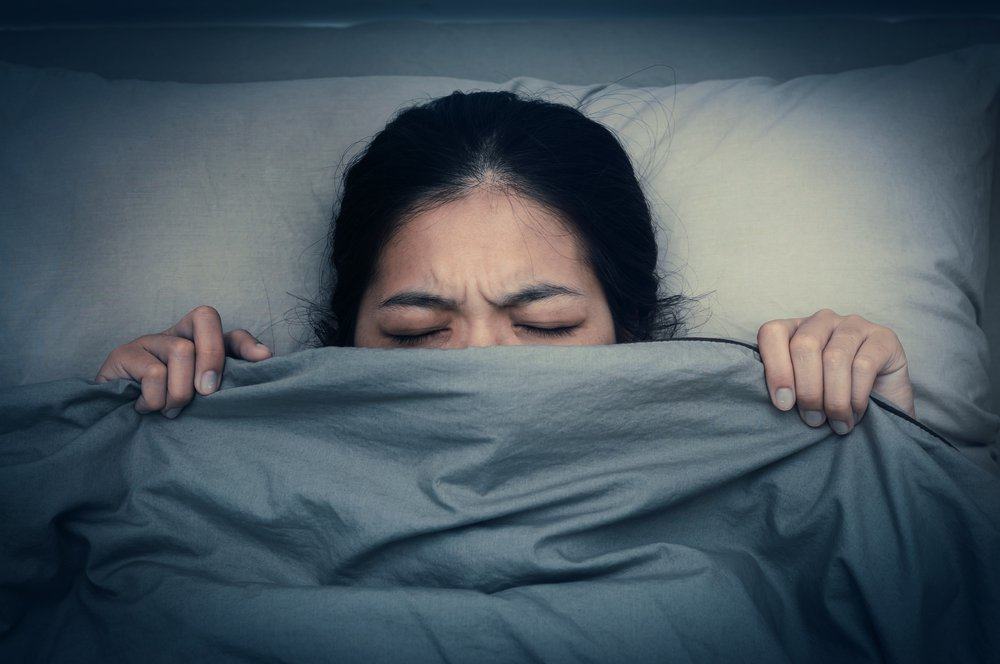Contents:
Medical Video: What Causes Nightmares?
Look left and right, you smile satisfied. As far as the eye can see, you are faced with a vast expanse of waves that greet the shining sand of the beach. The warmth of the sun rinsed his face, accompanied by a cool breeze that blew between his fingers. At the end of the view, a magnificent lighthouse stands firm, glittering bathed in sunlight as if to seduce you to approach. You feel a soft touch on your back. A familiar person whispers in your ear and says, - Let's go there, and you smile, nodding in affirmation. A group of small children whistled and bounced loudly.
The same hand that touched you is now caressing your hair lovingly, intertwined with your fingers and holding it tightly. Guiding you through a path filled with blooming flowers. The flowers turn into creeping roots. Twining you, stiffening the chest. Silence talk. You squirm trying to escape, weak helpless.
In the corner of your eye, you see the group of small children. One step, you are sure they will save you. The two-three-four steps get faster, you now see very clearly the bodies of the little ones have rotted in various places, tattered clothes, followed by dozens of others behind them. They die. Living corpse. Blood thirst. Running towards you. You feel a soft touch on the shoulder. With great effort, you turn around. Expect help to come. That figure, the familiar voice - the idol of the heart, lively semati - his face rot here and there, his mouth gaping wide, teeth dated, the smell of rotten flesh stinging from his mouth. He died. Living corpse. Blood thirst. Five centimeters from your face. A little bit more…
You wake up with a pounding heart, tangled hair, sweat flowing down your neck, and maybe even with shouts. The clock on the wall shows 3 am. Nightmare.
What causes nightmares?
Nightmares can feel very real and detailed, causing us to be in a state of panic and fear when awakened. You have always thought that nightmares only occur in children. And indeed, most children experience nightmares; around 10-50 percent of children aged 5-12 years experience severe nightmares, according to the American Academy of Sleep Medicine (AASM), reported by the Medical Daily.
Children's nightmares generally come from listening to stories or watching scary TV shows or movies. Nightmares will gradually disappear as children grow older, but 85 percent of adults still experience nightmares - 8-29 percent of people claim to have nightmares once a month, and 2-6 percent experience nightmares on one night each week. What is the reason?
Nightmares in adults
Dreaming is actually a thought process; the continuation of our mind train during our day of activities. "Nightmares are when we think about troublesome problems during REM (Rapid Eye Movement) and try to tidy them up. We often try to ignore difficult problems that bother us during the day, but when we sleep and are forced to 'be alone' inside our own heads, the brain will discuss this difficult problem, ”said Lauri Quinn Loewenberg, a professional dream analyst and author of Dream On It, Unlock Your Dreams Change Your Life.
Unresolved conflict is not the only cause of nightmares in adults. You can have nightmares after being triggered by a number of things you do or find when you wake up all day, such as:
1. Eat before bed
Eating foods or snacks that are high in carbohydrates approaching the hours of sleep a night can increase brain activity and body metabolism. Increasing both body activity leads to excessive brain performance during REM sleep, encouraging more dreams. One sleep study from Canada, reported by Mental Floss, showed that out of 389 subjects, 8.5 percent blamed attacks on nightmares on the foods they ate before going to bed.
Biochemists at the University of Australia from Tasmania conducted a study in which they added mustard and Tabasco sauce to dinner plates for six healthy young adult male subjects. The spicy taste of herbs is found to increase body temperature during the first sleep cycle, also increases total standby time and causes sleep anxiety in all study subjects.
Spicy food is not the only one to watch out for. An article published by The Journal of the Mind and Body stated that junk food - a study using ice cream and sweets as a trigger in the experiment - triggered more brain wave activity, causing seven out of ten participants to experience nightmares.
If you notice nightmares arise more often after your midnight snack, make the rule not to snack again after dinner, or at least avoid heavy foods before going to bed.
2. Drug side effects
Drugs that affect chemicals in the brain (such as antidepressants), as well as some blood pressure drugs, have been associated with nightmares as side effects. Talk to your doctor to see if different drugs or lifestyle changes might be a better alternative. If you have no choice but to take the drug, you should consider the pros and cons of your doctor - in some cases, it may be worth temporarily "living" with a nightmare if the drug helps you conquer a serious condition.
3. Lack of sleep
Sleep deprivation causes nightmares, and nightmares cause you to have trouble sleeping - a vicious circle that is endless. If you realize that nightmares arise more often during sleep after spending days staying up late, be sure to do proper sleep hygiene (such as taking a short break before going to bed by doing breathing techniques or making sure your bedroom is cold enough) to increase the chance of deep sleep.
3. Psychological problems
Anxiety, stress, post-traumatic stress disorder (PTSD), even fear every day (from fear of humiliating yourself in public, family members' deaths, to motorized accidents) and just watching horror films; all of this can trigger you to have a bad dream. But the root cause of nightmares can be associated with problems from the past.
Unresolved conflicts don't just disappear from the mind, they are hidden in the mind and shape our personality. Childhood trauma can cause feelings of insecurity or continue to seek self-justification, and feel like you are constantly being attacked if you accept criticism. This shows that our life experiences, both past and present, not only have an influence on our lives but also in our dreams.
If you have great stress, consult your doctor about the mechanisms for dealing with problems, including lifestyle changes, psychological counseling, and / or medication.
4. Sleep disorders
Sleep problems such as sleep apnea and restless leg syndrome can cause you to experience recurrent chronic nightmares. Ask your doctor about treatment options if you suffer from a sleep disorder, because treatment can help improve the quality of your sleep and also improve nightmares.
Brain, "director" of your nightmare
Nightmares, and dreams in general, occur during the stage of rapid eye movement (REM) sleep. REM sleep occurs every 90 minutes at night, and is associated with high brain activity, rapid eye movements and "disabled" motor activity. Depending on how long you sleep, your body will go through 4-6 sleep cycles overnight, and the REM stage will be longer with each sleep cycle. Most nightmares occur during the last third of your night's sleep.
The amygdala, the front area of the brain that plays a role in processing and remembering reactions to fear and anger, is a person who directs your nightmare. Brain scans during dreaming show amygdala activity that is very active during REM. This, coupled with the role of other factors mentioned above, might explain why the hyperactive amygdala during REM can produce a fear reaction experienced by dreamers in their subconscious.
"After we enter REM sleep, when dreaming takes place, the brain works differently (part of the brain becomes" dead "while others become very active), so the body is not literally in terms and words, you are thinking in symbols, images, and symbols as expressions of deepest feelings, "Loewenberg said.
In order to have a better understanding of our dreams, we must begin to overcome the problems that bother us during the day. "We talk to ourselves all day while awake. This habit does not change when we sleep, "Loewenberg said. He suggested, "Engage in a better moment of reflection with yourself when you are awake, which will ensure a better dream at night."
READ ALSO:
- Why Are Some People Who Can Sleep While Walking?
- 8 Most Frequently Asked Questions About Wet Dreams
- Can We Control Dreams?












